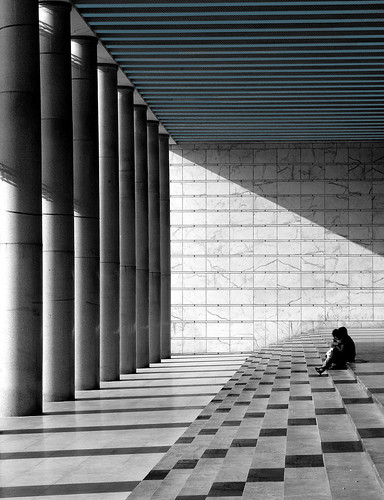It is a cold, dark December night in Rome, and I am on the grubby subway heading to Esposizione Universale Roma, or EUR, on the southern outskirts of the city, to attend a jazz concert by the sublime Brazilian artist, Cibelle. I arrive at EUR Palasport station, and am the only person to alight. I hurry upstairs into the wide Viale America and began the 10-minute walk to the concert, held in a school auditorium. Prostitutes lean against light poles, while scowling Romans in trench coats sit in their cars, cigarette in hand, browsing the ‘goods’ on display.
The wind blows across the lake, a striking contrast to the narrow, winding streets of Old Roma.
I am hungry. A pizzeria and a patisserie are open, their fluorescent glow forming halos through the foggy night sky, but they are completely empty, and I dare not enter.
I pass the imposing Banca di Roma building, which stands in darkness, a wall of glass. Some drunk teenagers pass in the opposite direction, slurring something in Italian, and I quicken my pace just a little.
I walk up the steps to the top of the hill where the auditorium sits. They are covered with slippery leaves, so I grasp the railing with one hand. A toad jumps across my path, startling me.
I finally arrive at the auditorium. A group of well-dressed Romans stand outside, chatting, laughing, smoking.
The concert is superb. Cibelle sings with the combination of sultriness and sass that I so love. Her band is funny,
When I get back to my hotel I am told that EUR is notorious for its crime, particularly for public brawls between neo-Fascist and Communist groups, and local gangs.
Still, I return the next day, eager to experience this fascinating place in daylight. I spend a good half-day walking around, photographing the monolithic structures, and drinking espresso.
EUR was conceived in the late 1930s by Fascist dictator Benito Mussolini as an out-of-town business district that would help direct the growth of Rome towards the Mediterranean sea. After Mussolini’s execution in 1945, the area continued to develop according to his original vision throughout the 1950s and 1960s, making EUR today the site of one of the finest collections of Fascist-era architecture in the world. When in EUR, you experience what Italy might have looked and felt like had it remained under Fascist rule.
It has shades of Paris’s LaDefense, and London’s Docklands. If you squint, it even feels a little like Canberra. But for me, EUR will remain in my memory as a surreal, cold, yet strangely lovable part of Rome.
Thursday, February 12, 2009
Reminiscing: EUR
Wednesday, January 21, 2009
Reminiscing: Confucius has closed
Confucius was a little Chinese restaurant in Kings Cross. It never occurred to me to eat there because it reminded me of a low-grade Chinese restaurant, the type you find in country towns. But its closure has me reminiscing.
Chinese restaurants first began appearing in Australia in the 1950s. Australia in the 1950s was a very different place to today. Meat and three veg was the staple diet, immigration was something to be feared - not celebrated - and a large proportion of the population lived in a regional or non-urban setting. Despite the advent of the White Australia policy and subsequent ‘yellow peril’ hysteria, there seemed to be one Chinese family in every town, who would own the one 'international' restaurant. Albury, the country town where I grew up, was no exception.
I have fond memories driving empty single-lane highways with my father throughout regional New South Wales and Victoria, knowing that no matter what town we end up in, it would have a (nearly always empty) Chinese restaurant waiting for us, serving such cultural delicacies as sweet-and-sour, chow mein and, best of all, deep-fried ice cream. I cringe at the thought of eating these foods today, and, it seems, so do my neighbours, as the closure of Confucius illustrates.
These restaurants demonstrate sheer entrepreneurialism. Men and women moved their families into foreign, remote and unwelcoming environments, and established a business in the hope of creating a new, more prosperous and enjoyable life.
In the urban and self-consciously evolved society that is contemporary Australia, it is easy to dismiss our first taste of international cuisine as pure cultural cringe. But I am grateful to our first international restaurants and the people that ran them, because they helped establish the rich culinary landscape that Australia enjoys today.
Without chow mein, we may never have had Kylie Kwong, and for that we should be eternally grateful.


